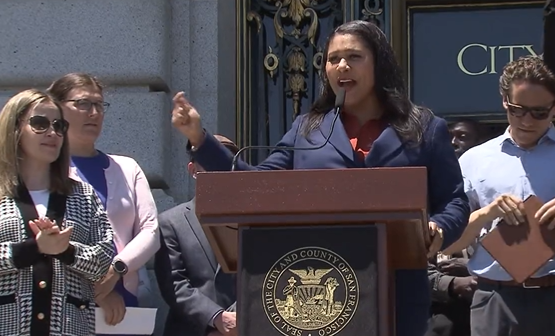California Construction News staff writer
San Francisco is planning to temporarily ease affordable housing requirements in an effort to kickstart dozens of construction projects and meet state requirements to build 82,000 housing units in the next eight years.
“We’ve got over 30,000 units in the pipeline,” Mayor London Breed said at a news conference. “We have the ability to do this, but we have to create bold policies to get out of the way to make it happen.”
The Housing Fee Reform Plan reduces the number of affordable units developers must include for approved projects as well those proposed over the next three years. It also reduces development impact fees levied on new housing construction.
Currently, Breed says the city “can’t even build 5,000 units a year.”
“We can’t do that, not just because of the money, but because of our policies. “If we are going to make San Francisco an affordable place for everyone to live, we need to be aggressive in reforming how we approve housing, reduce fees and get rid of all the obstructions that get in the way of building housing.
“I am tired of making promises that we’re going to get housing built in this city only to have obstructionists get in the way and stop these projects because they don’t want to block their view or because they don’t want to see affordable housing with low income residents in their neighborhood. Enough is enough.”
With approval by the planning commission, legislation goes to the board of supervisors for approval, but a date has not been scheduled.
The California Department of Housing and Community Development is also urging the commission to approve the ordinance, calling it an important first step “towards both facilitating the construction of housing and implementing the adopted housing element.”
The proposed legislation would make significant changes to the Planning Code to remove constraints on new housing across three main categories:
Eliminate unnecessary processes
- amend many existing code provisions that require the approval of a conditional use authorization (CU) by the planning commission to allow new housing to be approved faster – a CU approval can add six to nine months to the housing approval process by requiring hearings and discretionary approvals for projects that already comply with zoning laws.
Remove Restrictive Standards and Geographic Limitations
- eliminate requirements that limit the form or location of certain types of housing. This includes easing geographic limitations on senior housing, shelter and group housing, as well as reforming development standards like private open space and 1950s-era requirements for how far back a building must be offset from the property line, which will provide more flexibility for new housing proposals.
Expand incentives for housing
- eliminate certain restrictions to expand existing incentive programs for housing and expand access to the HomeSF program to waive fees for certain affordable housing projects.
“The Housing For All Directive is a critical step forward on housing projects,” said Louis Mirante, Vice President of Public Policy for the Bay Area Council. “We need the fee waivers and streamlining this directive offers to make housing in SF more affordable.”














